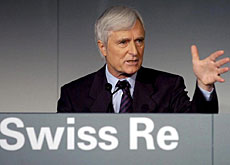Natural catastrophes hit profit at Swiss Re

Net profit at the world's second-largest reinsurer, Swiss Re, took a tumble last year as the firm was hit by the costliest United States hurricane season on record.
Swiss Re reported that its income fell by 41 per cent to SFr1.451 billion ($1.11 billion) because of the burden on its non-life reinsurance units.
But in a statement, Swiss Re said that in a year characterised by record natural catastrophes, the underlying business had performed well.
“2005 has been a year of contrasts. Swiss Re has benefited from its well diversified business to absorb an unparalleled sequence of exceptionally large natural catastrophe events,” commented the company’s new chief executive Jacques Aigrain.
Swiss Re, which is based in Zurich, said it had to digest SFr3 billion in large natural catastrophe claims, up from SFr1.2 billion in 2004, which was three times what they had expected.
Aigrain said provision for natural disaster claims in 2006 would rise significantly, but declined to say by how much. The company has introduced special pricing for high risk areas in coastal zones amid fears of a repeat of 2005.
“The climate pattern is worsening and sea temperatures în tropical areas has risen, increasing the risk of high winds,” Aigrain told a news conference on Thursday.
Premiums decline
Swiss Re’s combined ratio – an industry term gauging profitability – rose to 108.7 per cent. The higher the ratio stands above 100 per cent, the bigger an insurer’s underwriting loss. A result below 100 per cent indicates the degree of profitability.
The company said premiums earned declined by six per cent to SFr27.8 billion as it continued to focus on profitability rather than volume growth.
Swiss Re, which is at present the global number two player behind Munich Re, said its investment result increased in 2005 to 11 per cent to SFr6.6 billion, achieving an “excellent” 5.7 per cent return on investment.
Despite the largest claims on record for natural catastrophe events, shareholders’ equity increased 20 per cent to SFr22.9 billion, which Swiss Re said underlined the benefits of its well-diversified business.
Reflecting both lower net profit and increased shareholders’ equity, return on equity fell to 6.7 per cent.
Financial strength
The board of directors is to recommend a dividend of SFr2.50 per share reflecting a 56 per cent increase over 2004. The company said this reflected the group’s financial strength and the board’s confidence in future earnings.
In its outlook, Swiss Re confirmed that it expected to achieve earnings per share growth of ten per cent per year, and a return on equity average of 13 per cent over time.
In a related matter, the company said that 2005 had proven that size and diversification were “crucial” for absorbing insurance risk volatility.
With the planned acquisition of General Electric Insurance Solutions (see related story), Swiss Re will become the largest and best diversified reinsurer “building on an excellent base to sustainably grow earnings”.
swissinfo
In 2005, more than 97,000 people died due to natural catastrophes or man-made disasters.
Swiss Re figures show there were almost 400 catastrophes, which caused damage totalling more than $230 billion.
About one third, or $83 billion, was covered by insurance. In the previous year, insured catastrophe losses totalled $48 billion.
2005 turned out to be the costliest year ever for property insurers.
Swiss Re insures large or very volatile risks for other insurance companies. Its major competitor is Munich Re of Germany.
Apart from being one of the world’s leading reinsurers, Swiss Re is the world’s largest life and health reinsurer.
Swiss Re has been in the business of reinsurance since it was founded in Zurich in 1863.
Following its acquisition of General Electric Insurance Solutions (see related items), Swiss Re will have estimated combined revenues of SFr46 billion and assets of SFr265 billion (as of June 2005).

In compliance with the JTI standards
More: SWI swissinfo.ch certified by the Journalism Trust Initiative












You can find an overview of ongoing debates with our journalists here . Please join us!
If you want to start a conversation about a topic raised in this article or want to report factual errors, email us at english@swissinfo.ch.